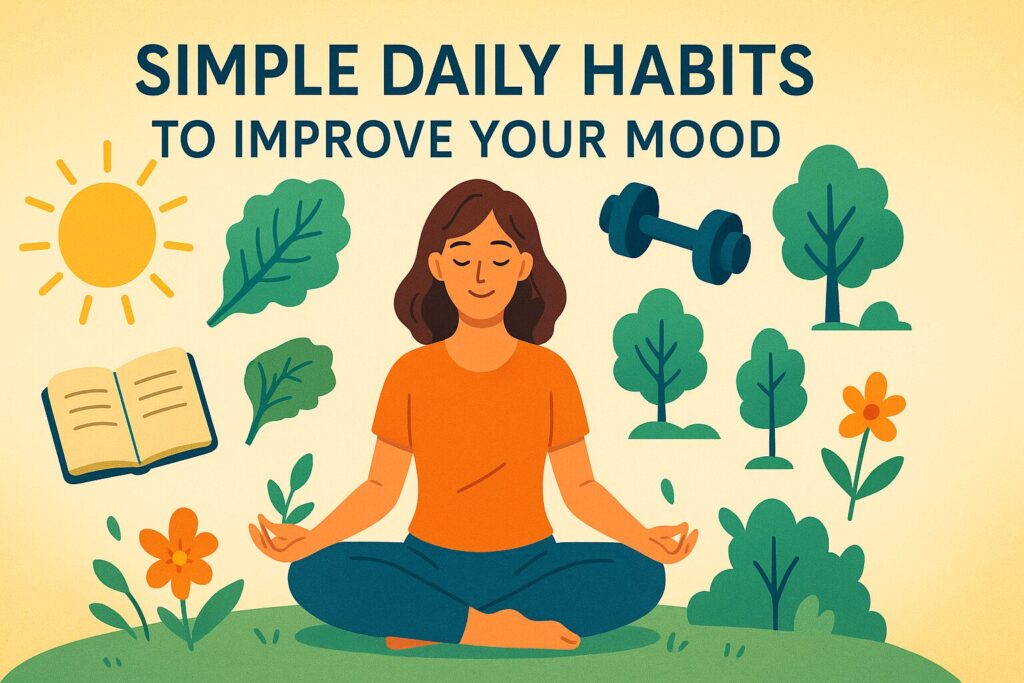Discover simple daily habits that can transform your mood and emotional well-being. Learn science-backed tips on nutrition, exercise, mindfulness, gratitude, sleep, and more to boost positivity every day.
Table of Contents
Introduction: Why Your Daily Habits Affect Your Mood
Your emotional well-being is not just shaped by big life events, it’s also influenced by the small choices you make every day. From how you start your morning to the way you wind down at night, your simple daily habits play a crucial role in how you feel mentally and physically.
Research in psychology and neuroscience shows that routines directly impact mood regulation, stress levels, and even brain chemistry. For example, a consistent sleep schedule helps balance hormones like serotonin and cortisol, which are linked to happiness and stress management (Harvard Health).
When healthy habits are repeated, they become automatic mood boosters. On the other hand, skipping meals, constant screen time, or irregular sleep patterns can drain your energy and make you feel irritable.
This article will explore science-backed simple daily habits from exercise and mindfulness to gratitude and nutrition—that can help you create a more positive and balanced life.
The Science Behind Mood and Daily Routines
Your mood is deeply connected to your body’s internal systems, particularly the circadian rhythm, the natural 24-hour cycle that regulates sleep, hormones, and energy levels. When your routines align with this rhythm, your brain functions more efficiently, leading to better emotional stability and focus.
- Hormonal balance: Habits like regular sleep and exercise help regulate serotonin and dopamine, the “feel-good” neurotransmitters that control mood and motivation.
- Stress management: Structured routines reduce uncertainty, which in turn lowers cortisol, the body’s main stress hormone.
- Neuroplasticity: Repeated behaviors can rewire the brain. For example, practicing gratitude daily has been shown to strengthen neural pathways linked to positivity (PubMed).
On the flip side, irregular schedules, constant multitasking, and poor lifestyle choices can disrupt these systems, leaving you feeling anxious, tired, or unmotivated.
Simply put, mood and daily routines are inseparable. By making small, intentional changes in your habits, you can create a ripple effect that improves both mental health and overall well-being.
Start Your Day Right: Morning Habits for Positivity
How you begin your day sets the tone for your mood and productivity. Implementing a few simple daily habits in the morning can help you feel energized, focused, and positive throughout the day.
- Wake up at a consistent time: A regular wake-up time supports your circadian rhythm, helping regulate mood and alertness.
- Hydrate immediately: Drinking water first thing boosts metabolism and reduces fatigue, which can improve mood.
- Morning movement: Even 10–15 minutes of stretching, yoga, or a light walk can release endorphins and improve emotional resilience (Mayo Clinic).
- Mindful moments: Spend a few minutes meditating, journaling, or practicing deep breathing to cultivate calm and focus.
- Positive affirmations: Repeating empowering statements helps shift your mindset and reduce negative self-talk.
By adopting these morning habits, you create a foundation for a more balanced day. Small actions taken consistently can make a measurable difference in your overall mood and outlook on life.
The Role of Nutrition in Boosting Your Mood
What you eat has a direct impact on your brain chemistry, energy levels, and emotional well-being. Incorporating simple daily habits around nutrition can significantly improve your mood and mental clarity.
- Eat balanced meals: Include complex carbohydrates, lean proteins, and healthy fats. These nutrients support neurotransmitter production, such as serotonin, which regulates mood (Harvard Health).
- Omega-3 fatty acids: Found in fish, flaxseed, and walnuts, omega-3s are linked to reduced anxiety and depression symptoms.
- Limit sugar and processed foods: High sugar intake can cause energy crashes and irritability. Whole foods provide more stable energy and mood support.
- Stay hydrated: Even mild dehydration can affect concentration and emotional stability. Aim for 6–8 glasses of water daily.
- Include mood-boosting micronutrients: Vitamins B6, B12, folate, magnesium, and zinc play roles in regulating neurotransmitters and can be found in leafy greens, nuts, seeds, and whole grains.
Small, mindful changes in your diet can enhance mental resilience, reduce stress, and promote overall happiness. By pairing proper nutrition with other simple daily habits, you reinforce a holistic approach to emotional well-being.
Exercise: The Natural Mood Enhancer
Physical activity is one of the most effective ways to boost your mood naturally. Regular exercise stimulates the production of endorphins and dopamine, neurotransmitters responsible for feelings of happiness and motivation. Integrating simple daily habits around movement can transform your mental and emotional well-being.
- Start small: Even 10–20 minutes of brisk walking, stretching, or light cardio can improve energy and reduce stress.
- Consistency over intensity: Daily moderate activity has more lasting mood benefits than occasional intense workouts.
- Outdoor exercise: Exercising in natural light increases vitamin D, which is linked to improved mood and reduced depression (NIH).
- Mind-body practices: Yoga, tai chi, and Pilates combine movement with mindfulness, enhancing both physical and emotional balance.
- Social workouts: Joining a fitness class or exercising with a friend provides motivation and boosts endorphin levels through social interaction.
By making exercise a simple daily habit, you not only improve physical health but also cultivate a more positive and resilient mindset. Even small, consistent efforts can have a profound impact on your overall mood.
Mindfulness and Meditation for Emotional Balance
Mindfulness and meditation are powerful tools for managing stress, improving focus, and enhancing emotional well-being. Incorporating them as simple daily habits helps train your mind to respond calmly to challenges rather than reacting impulsively.
- Start with short sessions: Even 5–10 minutes of meditation daily can reduce anxiety and elevate mood (Mayo Clinic).
- Breathing exercises: Deep, conscious breathing lowers cortisol levels and promotes relaxation. Try techniques like box breathing or diaphragmatic breathing.
- Mindful awareness: Pay attention to your thoughts, sensations, and surroundings without judgment. This practice reduces overthinking and emotional reactivity.
- Guided meditation apps: Tools like Headspace, Calm, or Insight Timer can provide structured sessions for beginners.
- Combine with other habits: Pairing mindfulness with morning routines, exercise, or gratitude journaling strengthens its impact on mood.
Practicing mindfulness consistently rewires your brain for greater resilience, clarity, and positivity. Over time, it becomes a simple daily habit that naturally supports emotional balance in both personal and professional life.
The Power of Gratitude in Everyday Life
Gratitude is more than just saying “thank you”—it’s a mindset that actively shifts your focus from what’s lacking to what’s abundant in your life. Making gratitude a part of your simple daily habits has been scientifically shown to improve mood, reduce stress, and enhance overall well-being (Harvard Health).
- Keep a gratitude journal: Write down 3–5 things you’re thankful for each day. This practice strengthens positive neural pathways.
- Express appreciation to others: Sending a thank-you note, text, or verbal acknowledgment fosters social bonds and elevates your mood.
- Reflect during routine tasks: Take a moment while commuting, cooking, or walking to notice and appreciate small joys.
- Gratitude meditation: Incorporate gratitude-focused meditations to reinforce feelings of contentment and positivity.
- Shift perspective: When facing challenges, identify lessons learned or small silver linings to maintain emotional balance.
By embedding gratitude into your daily life, you create a sustainable mood-boosting habit that complements other wellness routines like exercise, mindfulness, and proper nutrition.
How Quality Sleep Can Transform Your Mood
Sleep is a cornerstone of emotional and mental well-being. Poor sleep patterns can lead to irritability, anxiety, and reduced cognitive function, while consistent, restorative sleep supports positive mood and mental clarity. Incorporating simple daily habits that promote quality sleep is essential for long-term emotional health (National Sleep Foundation).
- Maintain a consistent schedule: Go to bed and wake up at the same time every day, even on weekends, to regulate your circadian rhythm.
- Create a bedtime routine: Relaxing activities like reading, gentle stretching, or a warm bath signal your body that it’s time to sleep.
- Limit screen exposure: Reduce blue light from phones, tablets, and computers at least an hour before bedtime to prevent disruptions to melatonin production.
- Optimize your sleep environment: Keep your bedroom cool, dark, and quiet, and invest in a comfortable mattress and pillows.
- Avoid stimulants: Limit caffeine, nicotine, and heavy meals in the evening to prevent sleep disturbances.
By treating sleep as a vital daily habit rather than a luxury, you reinforce emotional resilience, improve focus, and set the stage for a more positive, balanced mood.
Spending Time Outdoors: Nature’s Healing Effect
Spending time in nature has been shown to reduce stress, elevate mood, and improve overall mental health. Integrating this into your simple daily habits allows you to benefit from fresh air, natural light, and a break from digital distractions (American Psychological Association).
- Take daily walks outside: Even a 15–20 minute walk in a park or green space can lower cortisol levels and boost endorphins.
- Sunlight exposure: Natural light helps regulate circadian rhythms and increases vitamin D, which supports mood stability.
- Practice mindful observation: Focus on sights, sounds, and smells in nature to enhance mindfulness and reduce anxiety.
- Combine with physical activity: Hiking, cycling, or outdoor yoga combines the benefits of exercise with the restorative effects of nature.
- Gardening: Engaging with plants can reduce stress, provide a sense of accomplishment, and elevate mood.
By making time outdoors a simple daily habit, you reconnect with your environment, reduce mental fatigue, and nurture a calmer, happier mindset.
Digital Detox: Reducing Stress from Technology
Constant exposure to screens, social media, and digital notifications can contribute to stress, anxiety, and irritability. Incorporating simple daily habits to reduce screen time can help restore balance and improve your mood (Mayo Clinic).
- Set screen-free times: Allocate specific periods during the day, such as during meals or before bedtime, to disconnect from devices.
- Limit social media: Reduce scrolling by setting daily limits or using apps that track your usage.
- Practice device-free hobbies: Engage in reading, cooking, or creative activities that don’t involve screens.
- Notifications management: Turn off non-essential alerts to minimize constant distractions and mental fatigue.
- Digital decluttering: Regularly clean up emails, files, and apps to reduce cognitive overload and stress.
By adopting these simple daily habits, you give your mind a chance to rest, improve focus, and maintain emotional stability in a digitally demanding world.
Building Strong Social Connections for Happiness
Human beings are inherently social creatures, and meaningful relationships play a vital role in maintaining a positive mood and overall well-being. Incorporating simple daily habits to nurture social connections can reduce stress, boost self-esteem, and enhance life satisfaction (Harvard Health).
- Reach out daily: Send a message, make a call, or have a brief conversation with family, friends, or colleagues to maintain connections.
- Active listening: Focus on understanding and engaging in conversations rather than multitasking or distracted communication.
- Participate in group activities: Join clubs, fitness classes, or community events to meet new people and foster a sense of belonging.
- Express appreciation: Regularly acknowledge and thank people in your life to strengthen bonds and create positive interactions.
- Offer support: Helping others or providing emotional support can increase feelings of purpose and happiness.
By embedding social engagement into your routine as a simple daily habit, you create a support system that promotes emotional resilience and sustained happiness.
Small Acts of Kindness to Lift Your Spirits
Engaging in small acts of kindness not only benefits others but also significantly enhances your own mood. Making kindness a part of your simple daily habits encourages positive emotions, reduces stress, and strengthens social bonds (Greater Good Science Center).
- Compliment someone genuinely: A sincere compliment can brighten both your day and theirs.
- Perform random acts: Hold the door, help a neighbor, or offer assistance without expecting anything in return.
- Volunteer regularly: Contributing time or resources to community service fosters a sense of purpose and satisfaction.
- Express gratitude: Thank people for their efforts or support, which reinforces positive interactions.
- Share positive content: Uplifting messages, articles, or social media posts can create a ripple effect of positivity.
By consistently practicing kindness, you not only improve your mood but also cultivate a supportive and positive environment around you. Small, intentional gestures can become powerful simple daily habits for emotional well-being.
Conclusion: Creating a Consistent Mood-Boosting Routine
Incorporating simple daily habits into your life can have a profound and lasting impact on your mood and overall well-being. From morning routines and proper nutrition to exercise, mindfulness, and social connection, these habits work synergistically to create a balanced, positive mindset.
Key takeaways:
- Start small and be consistent even 5–10 minutes of focused activity can make a difference.
- Combine multiple habits for maximum effect, such as exercise followed by mindfulness or gratitude journaling.
- Monitor your progress and adjust routines based on what makes you feel most energized and content.
- Remember that self-care is a long-term commitment; small, consistent efforts often yield the most significant results.
By prioritizing these simple daily habits, you are not just improving your mood for a single day, you are cultivating resilience, emotional stability, and a happier, healthier life. Over time, these habits become automatic, forming a foundation for sustained mental and emotional well-being.



